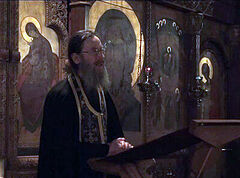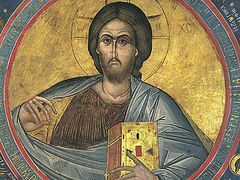Congratulations to all of you, dear brothers and sisters, and to many of you on partaking of the Holy Mysteries of Christ!
Saturday is a special day in the life of the Church. Today is the first Saturday of Lent, when the faithful children of the Orthodox Church receive Communion. And now the voice of our Sweetest Lord can be heard in the hearts of many of us. We will come unto him and make our abode with him (Jn. 14:23). And many of us who have fasted, prayed, and repented of our sins, lift up our hearts and minds to the Lord.
The first week of Lent has passed, and many of us have been thinking about the lives we lead, about the inner world we have, and how to change our inner world so that it may conform to the Gospel, the image that the Holy Scriptures describe for us and the holy Church of Christ pictures for us. And many of us understand intuitively that without correcting our image to conform to what the Holy Church gives us, we will never feel satisfied in this world. We will be doomed to seek happiness where we will never find it. We will continuously revolve in endless evil, preoccupied with ourselves, our selfishness, our anger and our passions—we will search and waste our strength in vain.
To what does the Holy Church call us, and what is revealed in a special way or should be revealed to a believer at the end of the first week of Lent? The Apostle Paul says that a man is justified… by the faith of Jesus Christ (Gal. 2:16). We also know that in order to have faith, a person must have two very important virtues: true fasting and true prayer. And our trouble often lies in the fact that we misunderstand what the Holy Church teaches us and calls us to do. Our faith, by itself, often boils down to what we actually have. It seems to us that the way we believe is precisely as it should be. “We have confessed and taken Communion—and everything is fine. God has mercy on me. I stand on my feet. I have food and drink. Therefore, I believe. Yes, maybe I believe correctly! But, this is a mistake, which happens because we fast and pray in the peculiar way that we understand fasting and praying, since our minds are sinful and our hearts are defiled.
What is fasting? Of course, we could talk for a long time about how we fast—what we abstain from, how tired we get, how we look forward to church services so that having confessed and received Communion, we can stop this fasting, this period of suffering. But if we read the Gospel, we will see that fasting is something else. Indeed, ascetic exercises are often accompanied by abstaining from food; but what is fasting in the eyes of the Savior?
Then came to Him the disciples of John, saying, Why do we and the Pharisees fast oft, but Thy disciples fast not? And Jesus said unto them, can the children of the bridechamber mourn, as long as the bridegroom is with them? But the days will come, when the bridegroom shall be taken from them, and then shall they fast (Mt. 9:14, 15). And as it often happens, in the minds of these very religious (from their point of view) people, Christ overturned everything. It seemed to them that they were fasting, but He assured them that they had not even begun to fast.
Why is that? Because, apparently, true fasting is an experience of God in the life of a Christian that can be roughly compared to what a bride experiences when her groom is taken away from her or what a groom feels when his bride is taken away from him. They died suddenly! The one you loved, this object of love, suddenly disappears from your life. When the Holy Psalmist prayed to God, he said that he forgot to eat his bread (cf. Ps. 101:5) (Not that he refused to eat bread, but forgot to do it!). What does this mean? The fact is that he did not ask, “How do I abstain from food?” He did not face questions of food, drink, or clothes. He had one global problem: What should he do to be united with his Beloved, with God?
And if we look at our fasting from this perspective, we will certainly have to admit that it barely approximates a pathetic excuse for what we should have done. We abstained from certain foods, and having fasted for a day, two or three, we already consider ourselves righteous. After all, we abstained from food and thus fulfilled our intention. By fasting for another day, we added a little bit to the “treasury of our righteousness”. But where is this important experience, which the Savior Himself defines as true fasting? Try to realize that your soul is a widow without God.
And what is prayer? For us, prayer boils down to hurrying through the prayer rule (more during fasts, less in the non-fast seasons), rattling it off, and often pronouncing the name of God in an offhanded way (the commandment, Thou shalt not take the name of the Lord thy God in vain is applicable to such prayer). We have read it through, are satisfied, and it seems to us that we have done everything we need to do, “we have fasted and prayed”. If we have fasted and prayed, then we are “true Christians”! But faith speaks of a different prayer. The Holy Fathers say that prayer is lifting up your mind and heart to God, and not to a prayer rule, not to confidence in the fact that “I have read everything”. Then what prayer can we talk about, even while standing in church? What can this be compared to in life? It is one thing if someone who wants to become a pilot is given a flight simulator and, during training, imagines that he is flying in it. But if while sitting in this simulator he believes that he is already flying, he will be told, “You’re crazy”.
The rules that the Holy Fathers give us are an ideal of what we must develop. When we read the prayers written by the saints, we realize that these are not our words—they were not born in our minds or our hearts. True, they nourish our souls, spirit and hearts with the righteous, pure and true thoughts that we are supposed to have, but do not have. After reading these words we should be willing to soar like the saints of God in prayer, to break away from earth to Heaven, to God so that our hearts can burn, rise up and pray. In what sense is prayer a conversation with God? This is communion with your Beloved, with the Bridegroom that we are speaking about, remembering Christ’s words about fasting. If someone in love catches himself thinking that he is continuously in mental contact with his beloved, or yearning to have contact, then the feeling of power, warmth, joy and longing for God should be many times greater.
Let us look carefully: Is there such a prayer in our hearts? Of course, there is nothing to boast of here. It appears that we have neither true prayer nor true fasting. Then the conclusion is obvious: Can our faith be called true if we have neither true fasting nor true prayer?
It is the mercy of God that we contemplate this at the beginning of Lent. The entire path is ahead of us, with all the opportunities and the most favorable conditions for these true labors to shine forth in our minds, hearts, and bodies. This can give us an absolutely different concept of faith—we will understand that we really have no faith, that faith is something greater.
According to the Apostle Paul, true faith is the evidence of things not seen (Heb. 11:1). The holy fathers say that faith is the degree of awareness of our dependence on God. When one fasts truly and asks God to put true understanding and a true feeling into his heart, true faith opens up to him. When faith touches the human heart, prayer will come, aided by this faith and fasting, during which you will “forget to eat your bread”, and then everything will fall into place.
Dear brothers and sisters, today I would like to wish that everything will fall into place in our minds and hearts as soon as possible. Let us labor zealously and courageously for this. And the Lord will bless us! Amen!




